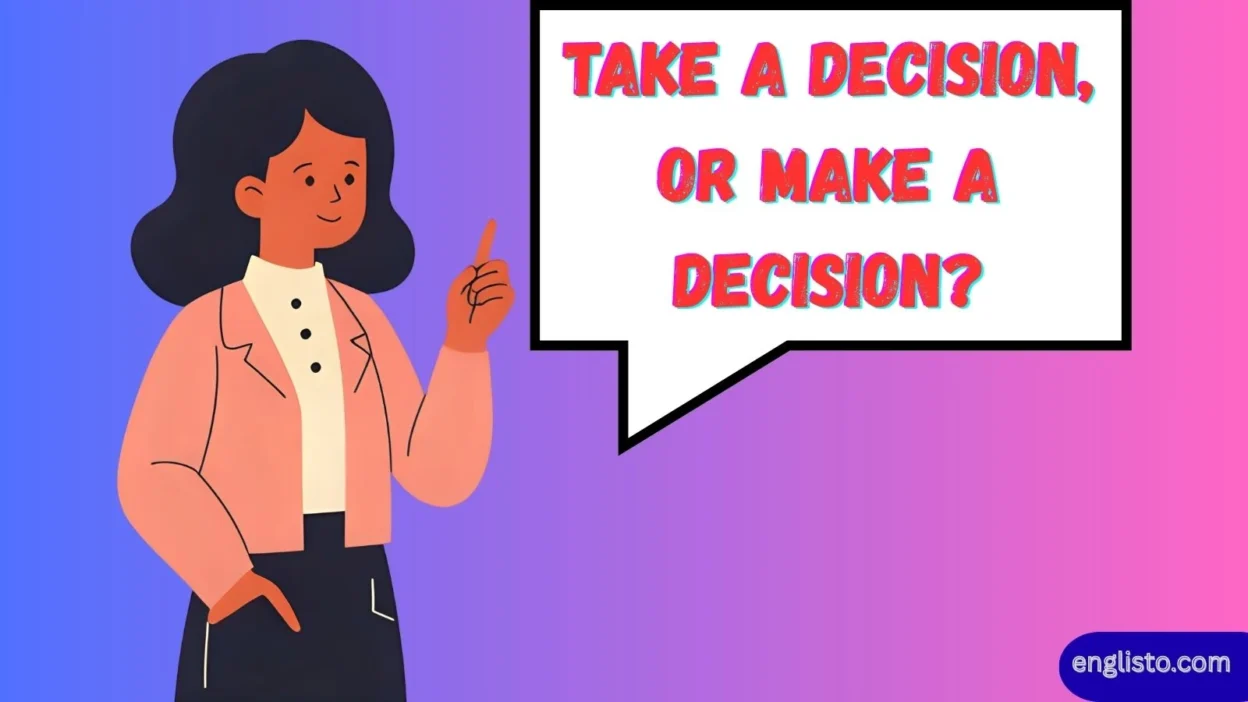When you’re faced with an important choice, do you take a decision or make a decision? At first glance, the difference looks tiny, but in English, small differences often carry big weight. Both phrases exist, but they don’t always mean the same thing, nor are they equally common across regions. In fact, one feels natural in American English while the other leans more towards British English and formal contexts. Take a Decision, or Make a Decision?.
This guide will unpack the meaning, usage, connotations, synonyms, and real-life examples of both expressions. By the end, you’ll know exactly when to use make a decision and when take a decision might be the better fit.
What Does “Make a Decision” Mean?
“Make a decision” is the default, most widely understood expression in both American and British English. It describes the process of weighing options, evaluating alternatives, and reaching a conclusion.
- Usage: Everyday English, business, education, casual speech
- Tone: Natural, neutral, universally understood
- Connotation: Emphasizes creation of a choice after thought
Examples:
- “She made a decision to change careers.”
- “The committee made a decision after hours of discussion.”
- “I can’t make a decision until I know all the facts.”
Synonyms:
- Reach a decision
- Arrive at a conclusion
- Decide
- Choose
Read More: Run Out the Clock – Meaning, Origin, and Everyday Usage
What Does “Take a Decision” Mean?
“Take a decision” is far less common and is viewed as formal, slightly old-fashioned, and more common in British English. It carries the idea of a decision being adopted or accepted—almost like a collective or authoritative act rather than an individual one.
- Usage: Formal British English, politics, governments, committees
- Tone: Official, serious, impersonal
- Connotation: Suggests finality and authority; the decision is imposed or accepted, not just created
Examples:
- “The Cabinet took a decision to withdraw troops.”
- “The board took a decision after long consultations.”
- “The government took a decision that affected millions.”
Synonyms:
- Adopt a resolution
- Pass a measure
- Approve a course of action
Key Differences Between “Make a Decision” and “Take a Decision”
Here’s a quick side-by-side comparison:
| Aspect | Make a Decision | Take a Decision |
| Region | Common in both AmE & BrE | Mostly British English |
| Frequency | Widely used, standard | Less common, formal |
| Tone | Neutral, everyday | Serious, official |
| Focus | Process of deciding | Final act of adopting |
| Context | Personal, business, casual | Governments, boards, committees |
| Example | “She made a decision to study law.” | “The Cabinet took a decision on new policies.” |
Why Is “Make a Decision” More Common?
According to Google Ngram Viewer, “make a decision” overwhelmingly dominates in both American and British English. Dictionaries such as Merriam-Webster and Oxford Advanced Learner’s Dictionary list “make a decision” as the standard collocation.
One reason is that in English, we generally “make” choices, plans, arrangements, and mistakes. The verb make naturally collocates with acts of creation or conclusion.
By contrast, take a decision sounds more passive and institutional, which is why it survives in political or bureaucratic contexts.
The Meaning of “Decision Taking” vs. “Decision Making”
Interestingly, some writers distinguish between decision-making and decision-taking:
- Decision-making = The process of considering options, analyzing pros and cons, and deliberating.
- Decision-taking = The moment of final choice or the act of adopting the decision.
This distinction often appears in business strategy, government policy, and academic discussions.
“Decision making is about exploring possibilities; decision taking is about committing to one path.”
Idiomatic Usage and Connotations
Language is rich in nuance. Here’s how these phrases “feel” in different contexts:
- Everyday life:
- “I made a decision to quit sugar.” (natural, conversational)
- “I took a decision to quit sugar.” (odd, too formal)
- “I made a decision to quit sugar.” (natural, conversational)
- Politics or governance:
- “The council made a decision to ban smoking.” (fine, but less formal)
- “The council took a decision to ban smoking.” (official, institutional tone)
- “The council made a decision to ban smoking.” (fine, but less formal)
- Business contexts:
- “Our team made a decision after the meeting.” (neutral, common)
- “Our team took a decision after the meeting.” (sounds like UK corporate or EU governance language)
- “Our team made a decision after the meeting.” (neutral, common)
Synonym Tables
Synonyms for “Make a Decision”
| Expression | Context | Example |
| Decide | General | “I decided to stay.” |
| Reach a decision | Formal | “We reached a decision after debate.” |
| Arrive at a conclusion | Formal/Academic | “The study arrived at a conclusion.” |
| Choose | Informal | “She chose the red dress.” |
Synonyms for “Take a Decision”
| Expression | Context | Example |
| Adopt a resolution | Political | “The UN adopted a resolution.” |
| Pass a measure | Legal/Government | “Congress passed a measure on tax reform.” |
| Approve a course of action | Formal | “The board approved a course of action.” |
| Accept a decision | Neutral/Official | “The committee accepted the decision.” |
Real-Life Examples in Media
- BBC News (UK): “The Cabinet took a decision to delay the vote.”
- The New York Times (US): “The president made a decision to veto the bill.”
- CNBC (Business): “Investors made a decision based on economic data.”
- Government Bodies: “International committees often take a decision after lengthy negotiations.”
Common Mistakes and Misconceptions
- “Take a decision” is not grammatically incorrect. It’s just less common.
- Don’t confuse it with “take action” or “take responsibility.”
- In everyday conversation, using “take a decision” might sound unnatural to an American listener.
Usage in Different Contexts
Personal Context
- Best choice: Make a decision
- Example: “I made a decision to start exercising daily.”
Business Context
- Safe choice: Make a decision
- Example: “Management made a decision to outsource customer service.”
Political or Official Context
- Acceptable: Take a decision (especially in UK English)
- Example: “The government took a decision on climate policy.”
Quick Tips to Remember
- If you’re writing for an international audience, use make a decision—it’s universally understood.
- If you’re writing in a formal British or political context, take a decision may be acceptable or even preferred.
- When in doubt, stick to make a decision—it’s the safest, most natural-sounding choice.
FAQs
Q1: Is “take a decision” wrong?
No, it’s not wrong. It’s just less common and sounds more formal, especially in British English contexts.
Q2: Do Americans ever use “take a decision”?
Rarely. Americans almost always say “make a decision.”
Q3: Can “make a decision” and “take a decision” be used interchangeably?
Sometimes, yes, but tone and context matter. “Make” works everywhere; “take” fits mainly formal or official settings.
Q4: Why does British English use “take a decision”?
It likely comes from influence of French (prendre une décision) and other European languages.
Q5: Which should I use in professional writing?
If your audience is mixed or international, always prefer make a decision.
Conclusion
So, should you take a decision or make a decision?
- Use make a decision in daily life, business, education, and anywhere clarity is key.
- Use take a decision in formal British English, political writing, or when emphasizing authority and finality.
In short: make a decision is the safe, natural, universal choice—but take a decision still has its place in official contexts.
Both reflect the same human experience: the moment when, after weighing the pros and cons, we choose a path and commit to it.



